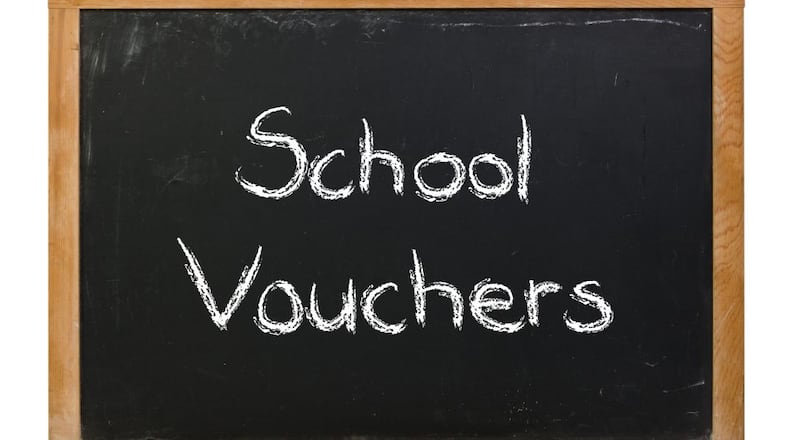When voucher bills were first introduced in the Legislature 25 years ago, advocates contended vouchers would improve Georgia’s academic outcomes. They relied on evidence from a few small, well-funded and curated pilot programs.
As with many reforms, that early promise evaporated when voucher programs were taken statewide to larger numbers of students. Well-regarded studies over the last 10 years of large programs in Louisiana, Indiana, Ohio and Washington, D.C., found learning losses among voucher recipients who left public schools for private schools that rival the declines we are now seeing from the pandemic.
Those desultory results dimmed the enthusiasm for vouchers — until now. Vouchers have been plucked from the ed reform scrapheap by Republicans and gussied up with new names such as promise scholarships and education tax credits.
Michigan State University professor Joshua Cowen has been studying vouchers for more than 20 years. “Five years ago, in my naiveté, I thought vouchers were dead,” he said. “Study after study was showing absolutely catastrophic results for kids who switched from public school to private school vouchers.” Cowen serves as a research advisor to the federally mandated evaluation of the Washington, D.C., voucher program.
But proponents regrouped and repackaged vouchers for the parents caught up in the current anti-woke, anti-diversity and anti-LGBTQ maelstrom. That’s why the sponsor of Senate Bill 233, state Sen. Greg Dolezal, R-Cumming, and his GOP colleagues keep talking about parent rights. These parents, they maintain, can choose how to use “their money,” a misleading description of the school taxes paid by everyone, including taxpayers without children.
The bill prioritizes values, stipulating that the private schools accepting taxpayer-funded vouchers can’t be required by the state to alter their “creed, practices, admissions policies, employment policies, or curricula in order to receive funds under the program.”
The bill would award parents $6,500 to use for private school tuition, textbooks, tutoring, curriculum, doctors, therapists, transportation, fund management fees and computers. Many critics contend vouchers will benefit middle-class families rather than low-income parents who can’t afford annual private school tuition, which averages $11,500 statewide and can go as high as $36,000 in metro Atlanta.
State Rep. Todd Jones, R-Cumming, predicts entrepreneurs will come to the rescue, saying, “My hunch is there are pretty smart people in education who are thinking, if the voucher comes in at $6,500, that they can create a school that would serve the children and wouldn’t provide for a tuition above $6,500.” Jones should consider the research showing schools that pop up in response to new voucher programs often have with little experience and have a high closure rate, said Cowen. In Wisconsin, 40% of these voucher schools have failed and closed their doors, he said.
While it’s not easy to get data about voucher programs, a study of the Florida Private School Choice Scholarship found 58% of the students stop using the voucher after two years or less. A study a decade ago by Cowen showed roughly 15%-20% of students exit annually from the Milwaukee program. (The data also show kids leaving these programs tend to do better once they do, says Cowen.)
With research proving vouchers don’t improve student achievement as measured by standardized tests, legislators now minimize the relevance of test scores, touting the modest gain in high school graduation rates found in some studies. We don’t know if those gains are due to private schools shedding less motivated students.
These same lawmakers point to low test scores in public schools to prove they are failing. They ignore the reality that struggling schools mirror their struggling communities. The Georgia General Assembly has long ignored the urgent need for affordable housing and accessible health care. One in 5 Georgia children lives in poverty, and the state ranks 45th in children’s health, according to the 2022 Kids Count report.
More than half of the students in these “failing schools” — the bottom 25% of the content mastery portion of the state report card — are certified for free lunch, homeless, foster, migrant or whose families receive monthly cash assistance, said Stephen Owens, education director of the Georgia Budget and Policy Institute. In its current version, SB 233 would give vouchers to families zoned for the lowest-achieving 25% of public schools.
“Using test scores to punish these schools while we remain one of only six states that provide no funding specifically to educate kids in poverty will only make the situation worse for the students who remain,” said Owens. “The history of private schools in this state is one of exclusion, which we continually confuse with excellence. I believe that any school that refuses to educate students based on income, disability, religion, sexual orientation or language proficiency is an abject failure.”
About the Author
The Latest
Featured



